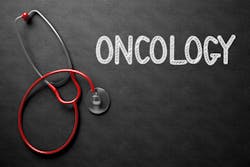The Oncology Care Model (OCM), an alternative payment model the Centers for Medicare & Medicaid Services launched in 2016, is coming to an end on June 30, 2022. As a follow-up, CMS has announced the Enhancing Oncology Model (EOM) to build on some lessons learned in the OCM and to add an equity focus.
EOM is a voluntary model that will run for five years, from July 2023 through June 2028. Model participants will include oncology practices that treat people with Medicare undergoing chemotherapy for breast cancer, chronic leukemia, lung cancer, lymphoma, multiple myeloma, prostate cancer, and small intestine/colorectal cancer.
Participating providers will also provide enhanced services such as patient navigation, care planning, collection of electronic patient-reported outcomes (ePROs), and screening for social needs that may affect treatment, such as transportation issues and nutritional needs. EOM will also encourage other payers to align with its core concepts to promote a consistent approach across payers and EOM participants’ patient population.
EOM implements a two-part payment structure for EOM participants to incentivize the provision of Enhanced Services while creating incentives to reduce avoidable costs and utilization and improve care quality. EOM participants will be responsible for the total cost of care during a 6-month episode. Depending on total episode expenditures and quality performance, EOM participants have the potential to earn a performance-based payment (PBP) or owe CMS a performance-based recoupment (PBR). PBP and PBR amounts will be adjusted based on actual quality performance.
EOM participants will also have the option to bill a Monthly Enhanced Oncology Services (MEOS) payment per beneficiary per month for the provision of Enhanced Services to EOM beneficiaries during each 6-month episode. EOM includes an additional MEOS payment for dually eligible beneficiaries, acknowledging the greater resources that may be needed to care for complex and underserved communities.
“There are stark inequities in the ability of people with cancer across race, gender, region, and income to access cancer screening, diagnostics, and treatment,” said CMS Administrator Chiquita Brooks-LaSure, in a statement. “CMS is working to advance President Biden’s Cancer Moonshot goals by helping Medicare cancer patients better navigate a challenging and often overwhelming journey. The Enhancing Oncology Model will incentivize participating oncology practices – including those in rural and underserved areas – to improve the provision of high quality, coordinated care that addresses patients’ social needs and improves patient and caregiver support.”
In addition to requiring participants to screen for health-related social needs, EOM includes other design elements that help drive CMS’ commitment to advancing health equity, including:
- Offering an additional payment to participating oncology practices that provide Enhanced Services to patients who qualify for both Medicare and Medicaid,
- Requiring participating providers to report patient demographic data (e.g., race, ethnicity, language, gender identity), and
- Requiring participating providers to develop plans showing how they will address health equity gaps in their patient population.
President Biden has set new national goals: cutting the death rate from cancer by at least 50 percent over the next 25 years, and improve the experience of people and their families living with and surviving cancer.
Earlier this month, HHS announced first-year funding awards of $215 million in a five-year, $1.1 billion investment into three national programs to prevent and control cancer. In May, HHS announced the availability of $5 million for community health centers, funded by HHS’ Health Resources and Services Administration, to increase equitable access to life-saving cancer screenings.
In a statement, Ted Okon, executive director, of the Community Oncology Alliance, issued a statement with an initial response to the model design. He said community oncology practices are fully committed to positive, patient-centered improvement of cancer care and look forward to supporting CMMI and practices to make the EOM a success.
“One significant concern is that CMMI is cutting the Monthly Enhanced Oncology Services (MEOS) payments in the EOM by nearly half of the OCM ($70 in the EOM vs. $160 in the OCM), while expecting more work from practices,” he wrote. “COA is extremely supportive of screening for health-related social needs and electronic patient-reported outcomes (ePROs), it seems unfair to burden practices with more work but pay less for it, particularly as practices are dealing with the return of the Medicare sequester cut, inflation, and ongoing COVID-19 practice challenges. We hope to hear more from CMMI about this issue.”
Okon also noted that COA is disappointed that there will remain an unnecessary one-year gap between the OCM ending and EOM beginning. “During this time practices will have to shoulder the extensive investments and operational changes put in place to benefit patients without reimbursement.”


